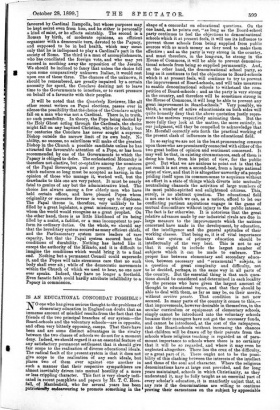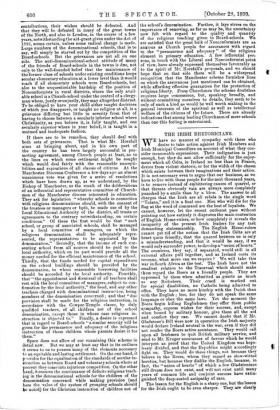IS AN EDUCATIONAL CONCORDAT POSSIBLE?
NO one who has given serious thought to the problems of elementary education in England can doubt that an immense amount of mischief results from the fact that the friends of the two principal branches of our system—the Board-schools and the voluntary schools—are in opposite, and. often very bitterly opposing, camps. That there have been and are some distinct advantages in the rivalry between the two classes of schools we do not for a moment deny. Indeed, we should regard it as an essential feature of any satisfactory permanent settlement that it should give fair scope to the realisation of diverse educational ideals. The radical fault of the present system is that it does not give scope to the realisation of any such ideals, but places two of them over against one another in such a manner that their respective sympathisers are almost inevitably driven into mutual hostility of a more or less crippling character. This fact is very clearly indi- cated in recent pamphlets and papers by Mr. T. C. Hors- fall, of Macclesfield, who for several years has been patriotic:Ay endeavouring to promote something in the shape of a concordat on educational questions. On the one hand, as he points out, "as long as the Board-school party continues to feel the objections to denominational schools which it at present feels, it will use its influence to prevent those schools from being supplied from public sources with as much money as they need to make them effective ; and as the party is very strong in the country, and must therefore, in the long-run, be strong in the House of Commons' it will be able to prevent denomina- tional schools from being so supplied permanently. And, on the other hand, the denominational school party, so long as it continues to feel the objections to Board-schools which it at present feels, will continue to try to prevent the improvement of Board-schools, and will take measures to enable denominational schools to withstand the com- petition of Board-schools ; and as the party is very strong in the country, and therefore will be sometimes strong in the House of Commons, it will long be able to prevent any great improvement in Board-schools." Very possibly, we think, a number of active educationists on both sides will quite honestly deny that the above quotation justly repre- sents the motives respectively animating them. But the more fully they look at the matter, the more entirely, in our judgment, will they be compelled to acknowledge that Mr. Horsfall correctly sets forth the practical working of the present clash of influences in the educational field.
In so saying we are not in the least pronouncing censure upon those who are prominently connected with either of the two great bodies of opinion and sentiment concerned. It may well be that, in existing circumstances, each of them is doing his best, from his point of view, for the public good. But what we are anxious to point out is that the net result is not even a second-best, from a large national point of view, and that it is altogether unworthy of a people priding itself upon its common-sense to acquiesce without an effort in a state of things which diverts into mutually neutralising channels the activities of large numbers of its most public-spirited and enlightened citizens. This, surely, is no abstract question. The educational field is not one in which we can, as a nation, afford to let our conflicting partisan aspirations engage in the game of mutual discomfiture without injury to the public interest. The fact is far otherwise. It is notorious that the great relative advances made by our industrial rivals are due in large measure to the improvements which the nations concerned have made in the development, by education, of the intelligence and the general aptitudes of their working classes. That being so, it is of vital importance that our system of primary education should be intellectually of the very best. This is not to say that it ought to include the largest number of subjects which it can be made to embrace. The proper line between elementary and secondary educa- tion, between necessary and " ornamental " subjcts, is a question of great complexity and difficulty, not to be decided, perhaps, in the same way in all parts of the country. But the essential thing is that such ques- tions should be considered and determined in each locality by the persons who have given the largest amount of thought to educational topics, and that they should be able to deal with them, as far as may be, on their merits, without arriere pensee. That condition is not now secured. In many parts of the country it comes to this,— that improvements, however desirable in themselves, in the secular curriculum or equipment of elementary schools, simply cannot be introduced into the voluntary schools because their managers have not got the necessary funds, and cannot be introduced, at the cost of the ratepayers, into the Board-schools without increasing the chances that children will be drawn off by their parents from the schools where religious teaching is regarded as of para- mount importance to schools where there is no certainty that it will be so regarded, and where it may even be neglected altogether. There lies the crux of the difficulty, or a great part of it. There ought not to be the possi- bility of this clashing between the interests of the intellect and those of the soul and character. Where the religious denominations have at large cost provided, and for long years maintained, schools in which Christianity, as they understand it, may be fully taught as an essential part of every scholar's education, it is manifestly unjust that, at any rate if the denominations are willing to continue proving their earnestness on the subject by appreciable contributions, their wishes should be defeated. And that they will be defeated in many of the great towns of the North, and also in London, in the course of a few years, notwithstanding the aid-grant given under the Act of 1896, seems certain, unless some radical change is made. Large numbers of the denominational schools, that is to say, will simply be starved out by the competition of the Board-schools. But the grievances are not all on one side. The anti-denominational-school attitude of many of the friends of Board-schools in the towns is due, not only to the well-founded belief that the maintenance of the former class of schools under existing conditions keeps secular elementary education at a lower level than it would reach if all elementary schools were Board-schools, but also to the unquestionable hardship of the position of Nonconformists in rural districts, where the only avail- able school is a Church-school under the control of a clergy- man whom, justly or unjustly, they may altogether distrust. To be obliged to have your child either taught doctrines of which you disapprove, or taught no religion at all, is a grievance differing but little in severity from that of having to choose between a secularly inferior school where Christianity, as you believe it, is fully taught, and one secularly superior where in your belief, it is taught in a maimed and inadequate fashion.
If there are to be remedies, they should deal with both seta of grievances. That is what Mr. Horsfall aims at bringing about, and in his own part of the country he has been largely successful in pro- moting agreement, among Church people at least, as to the lines on which some settlement might be sought which would deal fairly with the reasonable suscepti- bilities and aspirations of all classes of citizens. At the Manchester Diocesan Conference a few days ago an almost unanimous vote was given for a series of resolutions which have been drawn up, as we understand, by the Bishop of Manchester, as the result of the deliberations of an influential and representative committee of Church- men of the Manchester diocese interested in education. They ask for legislation 'whereby schools in connection with religious denominations should, with the consent of the trustees or managers or bpth, be made use of by the Local Educational Authority of the district, all trusts or agreements to the contrary notwithstanding, on certain conditions." Of these the first would be that 'such school, or group of associated schools, shall be managed by a local committee of managers, on which the religious denomination shall be adequately repre- sented, the representatives to be appointed by the denomination." Secondly, that the income of each con- senting school from all sources should be paid to the local authority, which on its part would provide all the money needed for the efficient maintenance of the school. Thirdly, that the funds needed for capital expenditure on the school buildings should be provided by the denomination, to whom reasonable borrowing facilities should be accorded by the local authority. Fourthly, that "the appointment and dismissal of all teachers shall rest with the local committee of managers, subject to con- firmation by the local authority," the' head, and any other teachers charged with denominational instruction, being members of the denomination concerned ; and that "due provision shall be made for the religious instruction, in accordance with the Cowper-Temple clause, by duly qualified teachers, of all children not of the school denomination, except those in whose case religious in- struction is objected to." Finally, a desire is expressed that in regard to Board-schools "a similar security will be given for the permanence and adequacy of the religious instruction of those children whose parents desire it for them."
Space does not allow of our examining this scheme in detail now. But we may at least say that in its outlines it seems to us to possess many of the elements necessary to an equitable and lasting settlement. On the one hand, it p-ovides for the equalisation of the standards of secular in- struction as between Board and voluntary schools where at present they come into injurious competition. On the other hand, it ensures the continuance of definite religious teach- ing in the denominational schools for the children of the denomination concerned while making provision (and here the value of the system of grouping schools should be noted) for the Christian instruction of children not of the school's denomination. Further, it lays stress on the importance of removing, as far as may be, the uncertainty now felt with regard to the quality and quantity of the religious teaching given in Board-schools. We are satisfied that the great bulk of Nonconformists are as anxious as Church people for assurances with regard to the "permanence and adequacy" of the religious element in primary education. A few influential per.. sons, in touch with the Liberal and Nonconformist point of view, have already expressed themselves favourably as to the spirit of Mr. Horsfall's proposals, and we should hope that on that side there will be a widespread recognition that the Manchester scheme furnishes lines on which the assurances just mentioned can be obtained, while affording effective guarantees for the protection of religious liberty. From Churchmen the scheme doubtless requires large concessions, but, speaking broadly, and without committing ourselves to details, they seem to be only of such a kind as would be well worth making in the general interests of the spiritual as well as intellectual welfare of the citizens of the future. There are already indications that among leading Churchmen of more schools than one this feeling is entertained.







































 Previous page
Previous page